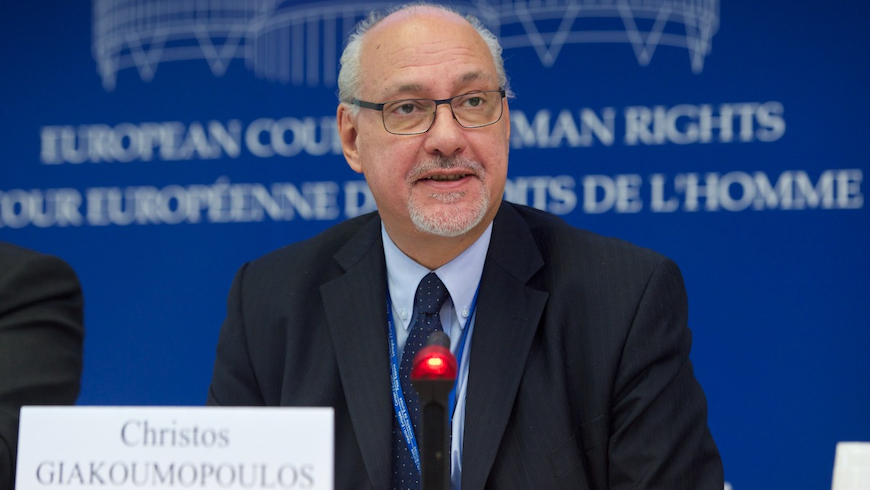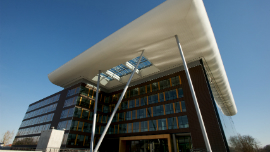Opening speech by Mr Philippe Boillat
International Conference "Human Rights and Biomedicine: Ethical and legal aspects of organ donation"
Moscow, 26 April 2016
Dear Minister,
Ladies and Gentlemen,
Dear Colleagues,
Distinguished Guests,
It is an honor and privilege for me to welcome you on behalf of the Council of Europe, which co-organised this Conference together with the Ministry of Health of the Russian Federation. At the outset, I would like to warmly thank you, Ms Skvortsova, for the interest manifested by the Ministry of Health in the activities conducted by my Directorate General and for your personal support given to today’s conference. I would also like to thank, through you, the staff of your Ministry for their excellent cooperation in the organization of the Conference.
We are all the more delighted to be in Moscow today as our high-level Conference is associated with the celebration of the 20th anniversary of the Russian Federation’s accession to the Council of Europe.
May I reiterate, Madame Minister, that we see this accession as a highly important milestone in the European history. I seize this occasion to welcome our former Secretary General, Mr Daniel Tarschys, who has joined our event today: we all remember how much you did for this accession to happen. I am convinced that 20 years ago we went through a turning point to anchor the Pan-European dimension of the Council of Europe.
Russia’s 20-year membership with the Organisation has been active and effective in practice. The Russian Federation has signed and ratified 60 Conventions of the Council of Europe, thus becoming an integral part of the European legal space. There is no disagreement about this and I note that the Russian Constitutional Court reiterated it once again last week. The Council of Europe conventions, taken in conjunction with the practice of its judicial and monitoring bodies, constitute today an integral part of Russian law.
Moreover, some of those Conventions have been sponsored and actively promoted by Russia itself. The protection of human rights in the biomedical field is one of the areas where Russian contribution was and remains of great relevance and importance. I will limit myself only to two examples.
- Five years ago, in Moscow, we opened to signature together with the then Minister of Health and the Minister of Foreign Affairs the Medicrime Convention, known also as Moscow Convention. It was the first legal document criminalizing the production and distribution of counterfeit medical products;
- As late as last autumn, the Russian Federation signed the Council of Europe Convention against Trafficking in Human Organs. We are grateful to the Russian authorities for their active participation to the drafting of this new European instrument and for their commitment to prevent and deter criminal acts of human organs’ trafficking at both European and national level.
All this to say, Madame Minister, that Russia’s 20-year membership with the Council of Europe has never been a “one-way road”. Nor has it been at all times an easy road. However the numerous and tangible results we have achieved in this way speak for themselves, not least in the legal and judicial fields. And I trust that our current and future cooperation will further contribute to the common legal space that holds our large continent together. I am also convinced that today’s conference will open new ways of strengthening the Russian contribution to the Council of Europe’s activities in the relevant areas.
* * * * *
Dear Minister,
Ladies and Gentlemen,
This conference is dedicated to bioethics, which is commonly understood as protection of human rights in the field of biology and medicine. Scientific developments lead to better protection of human health, opening possibilities for new medical treatment, diagnostic and preventive measures. At the same time, they give rise to concern about possible misuse and abuse to the detriment of the integrity and autonomy of patients, as well as their privacy. There is also a risk that medical practices lead to violations of human dignity.
Issues arising in the biomedical field are often complex and sensitive. The related human rights challenges need to be addressed at both national and international level to build trust and promote practices that are both effective and respectful of human beings. Organ donation and transplantation, which are specifically addressed during this Conference, demonstrate a genuine need for synergy and interaction to be developed between the protection of human rights and the promotion of new medical technologies.
Organ transplantation is an eminent medical technique which makes it possible to save lives in critical situations. But its misuse may also endanger human life, wellbeing and dignity of both donors and recipients. The Council of Europe has therefore developed a substantial arsenal of legal tools based on the Convention on Human Rights and Biomedicine (the Oviedo Convention) and its Additional Protocol concerning transplantation of organs and tissues of human origin. These were the first international legally binding instruments in this field. A further important step was achieved in 2015 through the adoption of the Convention against Trafficking in Human Organs which I mentioned earlier.
I note that the multidisciplinary nature of the ethical and legal issues raised by organ transplantation,- and by bioethics in general, - has prompted leading experts in philosophy, medicine and law to attend our Conference. It will give us a unique opportunity to look into ethical and legal aspects of organ donation from three perspectives: the perspective of patients, that of medical professionals, and the views of legal professionals. I would like to seize this occasion to welcome the very numerous representatives of medical institutions, lawyers and all others concerned by bioethics.
I am sure that both the Conference and our following joint actions will be mutually enriching. They will contribute to the continued cooperation within the Council of Europe and facilitate the ongoing preparatory work for signature and ratification of the relevant Council of Europe Conventions by the Russian Federation, including the Oviedo Convention on Human Rights and Biomedicine. I see this also as an important step forward in the dialogue we need to enhance between the legal and the medical professionals on issues of common concern.
* * * * *
Dear Minister,
Ladies and Gentlemen,
Let me conclude by highlighting once again the Council of Europe method and approach. We strongly believe that dialogue and cooperation are essential to pursue the ultimate goal of our Organisation as it is reflected in the Statute: to achieve a greater unity between our member States with a view to safeguarding and realising our common European heritage. This is what makes our raison d’être and our main difference. Indeed, the Council of Europe is engaged in direct cooperation and interaction with national authorities in numerous fields to promote best practices and thus to facilitate the implementation of our common legal standards.
Technical cooperation is an important component of the Council of Europe strategy, our main added-value. Training of legal professionals plays an increasing role in that regard, as you may know through our very prominent HELP Programme – the only pan-European programme for training of legal professionals which has been successfully implemented since last year in the Russian Federation. My Directorate General values very much our continuous cooperation with the Supreme Court, Constitutional Court, the General Prosecutor’s Office, and the Ministry of Justice of the Russian Federation. We are extremely pleased that this conference provides hopeful ground for further development of our fruitful cooperation with the Ministry of Health, which I commend once again for their genuine interest in the issues on our common agenda.
I am looking forward to our open and topical discussions today and to our continued cooperation with all Russian authorities concerned.
Thank you!









